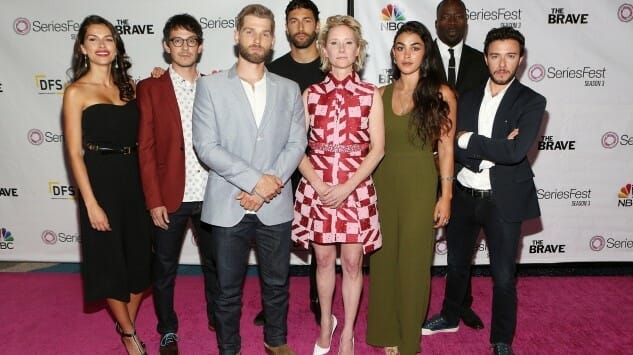SeriesFest Season 3 Proves It’s Here To Stay
Photos by Mark Rabinowitz and Jason Bahr/Getty Images
By now it’s pretty obvious that we’re in a true Golden Age of television. The quality up and down the dial (yes, I’m that old) is simply outstanding. Add to that the streaming services and there’s simply too much exceptional content to watch in one lifetime. If you expand the field to films and books, a case can be made that we’re in a Golden Age for storytelling. But I digress.
Back in the late 1980s/early ‘90s, mainstream America got a glimpse of the burgeoning indie film movement when (relatively) low budget films like Steven Soderbergh’s Sex, Lies, and Videotape (1989) and Quentin Tarantino’s Reservoir Dogs (1992) hit the screen and became cultural touchstones. Both screened at the then nascent Sundance Film Festival and both launched the careers of two of the most influential filmmakers of the last 30 years.
Flash forward a decade or three and the time is right for another leap forward in filmed content. From Breaking Bad and Mad Men HBO, Netflix and the Marvel Cinematic Universe, episodic storytelling is undergoing a sea change and like virtually any other massive shift (culturally, politically, environmentally) it will likely take us some time and distance to really see what we have wrought.
However one thing is clear: TV is no longer the 2nd class choice for talent. The days of being shocked at seeing a movie star like Sally Field or Glen Close doing TV are over and more and more, truly excellent, “cinematic” work is being done for the “small” screen. Along with the rise of quality content has been a slow but steady rise in creators making independent pilots. Once solely the domain of studios and major production companies, TV is slowly being democratized by the rise of TV sections in film festivals and, more importantly, the appearance of dedicated TV fests.
Having recently wrapped its third “season,” SeriesFest is the brainchild of founder/CEO Randi Kleiner and founder/CCO Kaily Smith Westbrook. The event has grown rapidly but organically over that time and although it isn’t the first TV festival to pop up, it seems to be doing everything right. From opening night at Red Rocks-this year featured En Vogue, Common and Ms. Lauryn Hill, and the world premiere of the music episode of CNN’s The Nineties-to a well-curated independent pilot competition to exciting sneaks of upcoming cable and network series to a showcase of international offerings, SF packs a lot into five days. So much so that even with screener links I still wasn’t able to see everything.
 Photo by Mark Rabinowitz
Photo by Mark Rabinowitz
One of the key elements to SeriesFest’s artistic success is the Independent Pilot Competition, which once again offered up a collection of top-notch fare and contained several shows that I would consider “broadcast ready.” Top of this list was the world premiere of Up North, created by Emil Pinnock and directed by Pinnock and Damaine Radcliff. Well-acted and impeccably directed, Up North looks at incarceration and inner city life from various points of view: from the wrongfully arrested straight-A student to the murderer about to be paroled to the street-level dealer whose choices affect everyone around him. Based on Pinnock’s personal experiences as a wrongly arrested young man in the New York City correctional system, Up North is a fully realized look at New York’s deeply-flawed and corrupt prison system and the violent life that feeds it. It’s a powerful piece of work from an exciting new voice.
Up North picked up SeriesFest awards for Best Drama Pilot, Best Actor for Ian Duff and best director for Pinnock and Radcliffe.
Another entry in the “ready for prime time” category is Patrick Wimp, Angie Gaffney and Ted Reilly’s Public Housing Unit, a 1980’s set drama about a trio of Chicago cops tasked with policing the Windy City’s infamous public housing projects. Based on the true stories of real life Chicago officers Eric Davis, Jimmy Martin and Charlie Toussas, Public Housing Unit is a gritty and occasionally humorous police drama more in the vein of Hill St. Blues than Law & Order. Well acted by Chris Boykin, Kamal Angelo Bolden and Ira Amyx as Davis, Martin and Toussas, the pilot packs a lot into 48 minutes, setting the scene and giving us back stories on all three leads with impeccable pacing and dialog. It’s no surprise that it nabbed the jury award for best writer in a drama for co-creator Wimp. It also nabbed the Best Actress award for Destini Huston.
Haroula Rose’s Lost & Found finds a group of 30-something friends gathering for, well, a divorce party. Stella (Melonie Diaz) and Ian (Wil Janowitz) are splitting up and rather than treat it as a sad and anxious occasion, they decide to have an “un-wedding,” with an officiate (Rebecca, played by Jennifer Lafleur), guests and even a little balloon release. Of course no un-wedding is complete without the mother of the un-bride (Laura Lee Botsacos) adding even more drama to an already tense situation. It’s an awkward premise that Rose manages to make less contrived that it might appear at first blush. The cast are all skilled performers and there’s clearly material here to mine, but Rose’s big hurdle is going to be crafting a world that is more than (mostly) white people going through a series of early-mid-life crises.
-

-

-

-

-

-

-

-

-

-

-

-

-

-

-

-

-

-

-

-

-

-

-

-

-

-

-

-

-

-

-

-

-

-

-

-

-

-

-

-









































